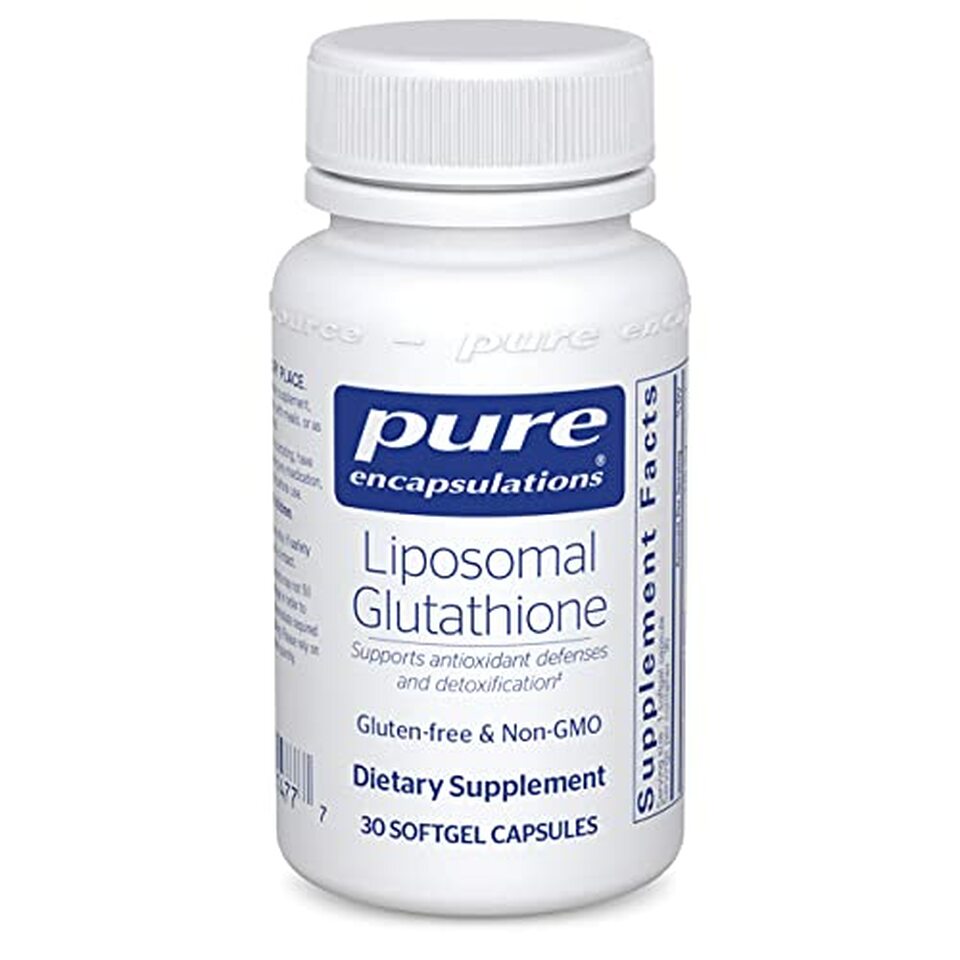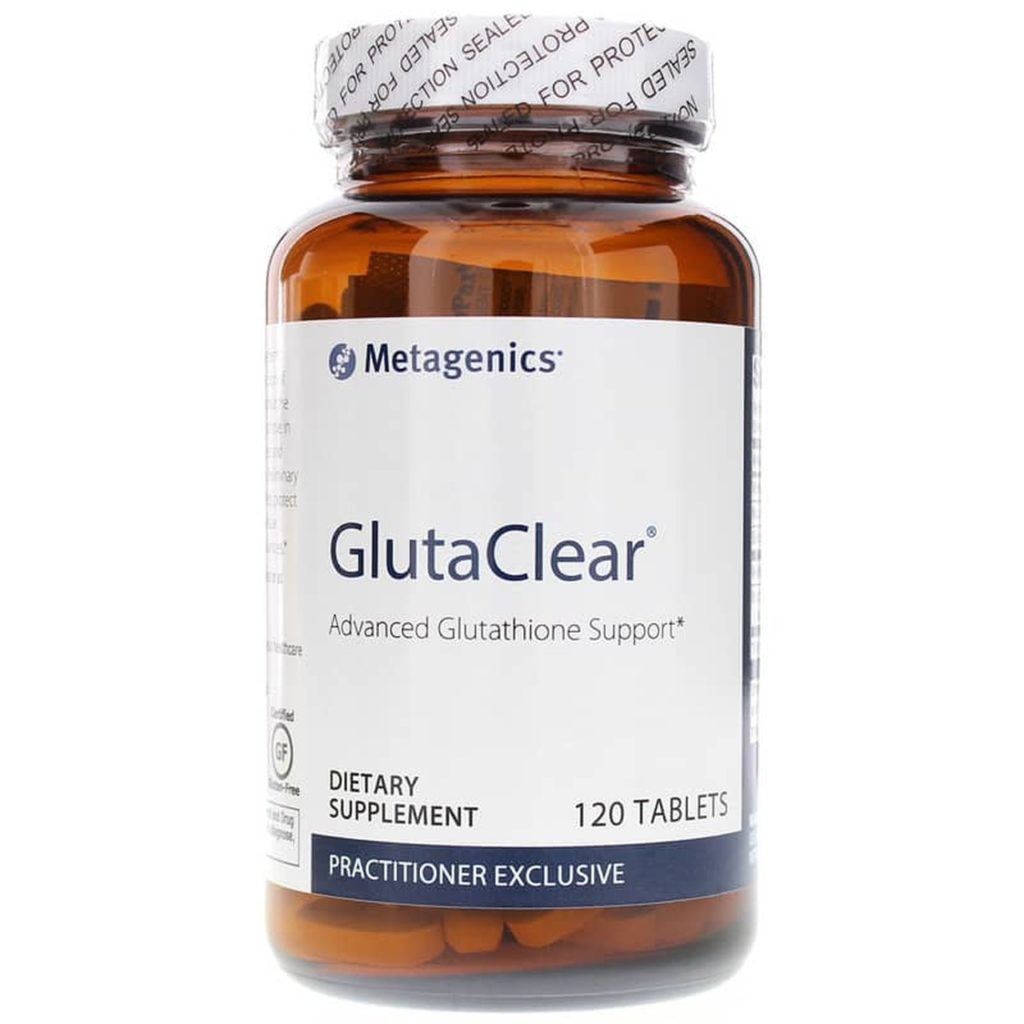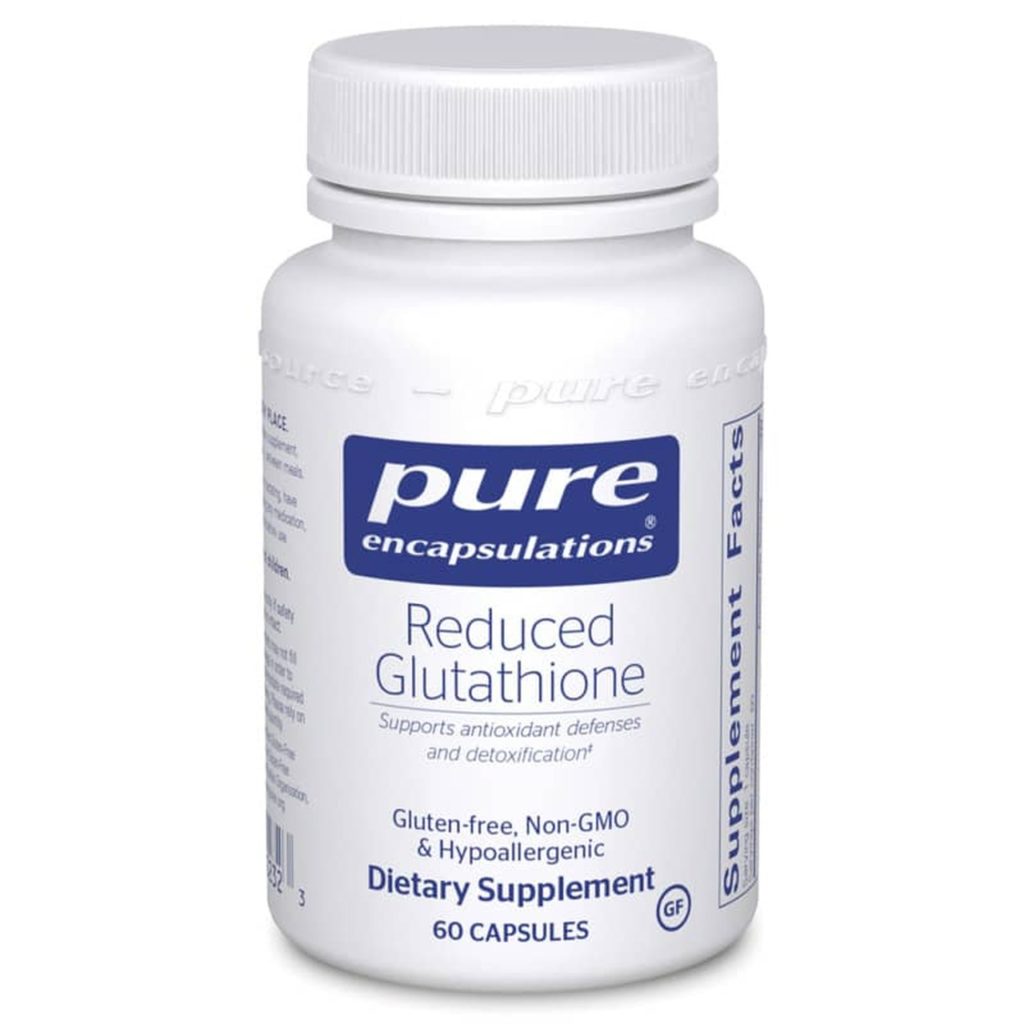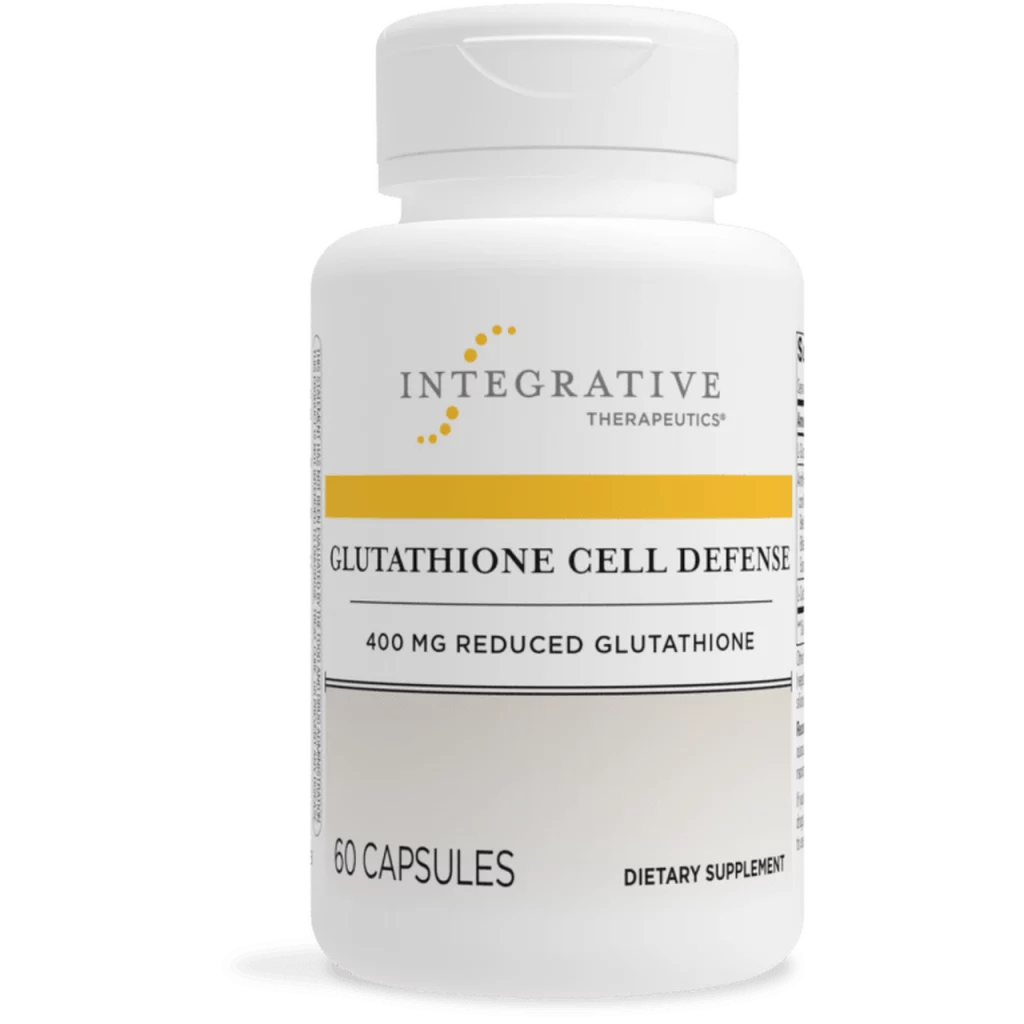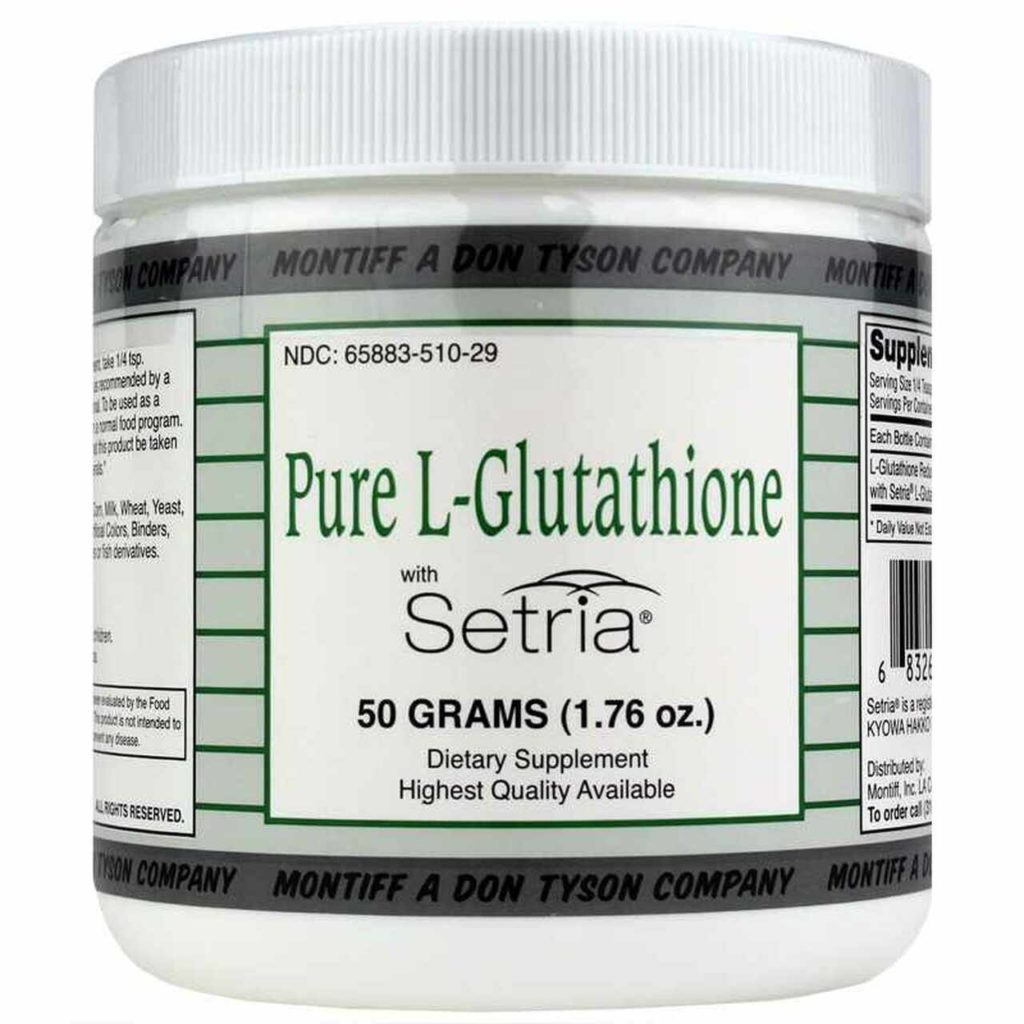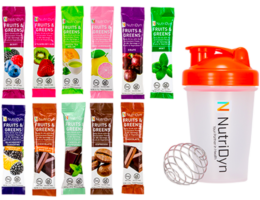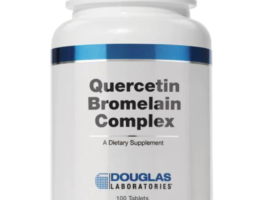Last updated on April 17th, 2024 at 10:11 am
With so many choices these days it can be hard to figure out what the best of anything is especially the best glutathione supplements. Let our team of doctor-trusted experts guide you as we explore this powerful antioxidant. Glutathione is a word that many people are unfamiliar with. However, if we were to say the words antioxidant, inhibits oxidation, attacks free radicals, you’d likely recognize these words. Essentially, glutathione encompasses this. It is an antioxidant that helps neutralize free radicals and inhibit oxidative stress which prevents cell damage.
In this article, we’ll cover all you need to know about glutathione, what it is, what it does for the body, and the different types. We will also answer your questions like what foods contain glutathione, glutathione benefits, and of course, what is the best glutathione supplement brand?
What is Glutathione?
Glutathione(1) pronounced gloo·tuh·thai·own, is a tripeptide consisting of three amino acids; cysteine, glycine, and glutamic acid. It is found in plants, fungi, animals, and some bacteria. The human body produces this critical compound that plays an essential role in our body. We can help our body by eating foods high in glutathione or by glutathione supplementation.
What Does Glutathione Do for The Body?
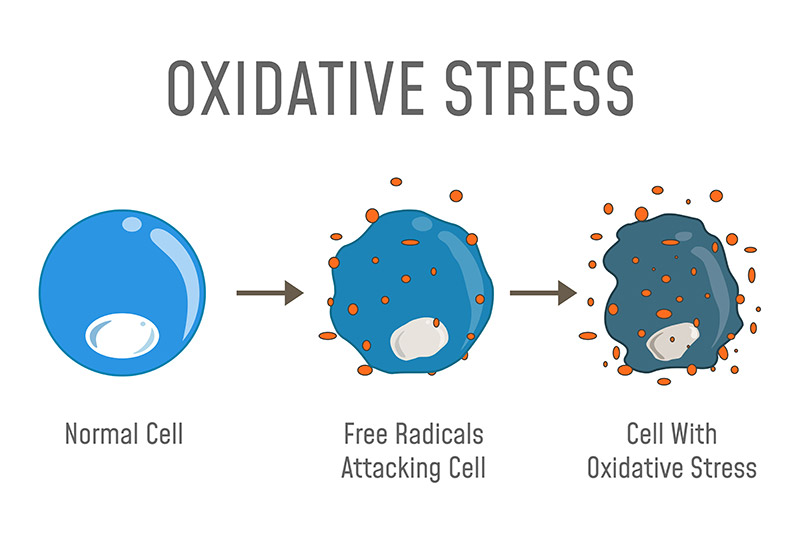
As previously mentioned, glutathione is an antioxidant that helps reduce oxidative stress. It also helps prevent free radicals from damaging cells within the body. This powerful antioxidant may therefore reduce oxidative stress markers in the body as well as reduce the symptoms of inflammation caused by an autoimmune disease. It may also help address toxin exposure by transporting amino acids across cell membranes. It also works to detoxify chemicals within the liver (2).
Glutathione plays an important role in our central nervous system helping to prevent oxidative damage and increased oxidative stress. According to an article published about glutathione synthesis (3), it is vital to the health of our immune system. In fact, some would argue that the main function of glutathione is to perfect the innate immune response to infection (4).
What Is the Difference Between Glutathione And L-Glutathione?
Glutathione, otherwise known as reduced glutathione (GSH), and L-glutathione or liposomal glutathione, are powerful antioxidants. L-glutathione, specifically, is an active oxidized form that exists encapsulated inside a lipid molecule (5). The big benefit here is that your body absorbs L-glutathione more easily. It also survives stomach acid much better than reduced glutathione so your body tends to absorb more of it and will therefore see increased antioxidant levels.
Reduced glutathione does not undergo encapsulation and is in an active state that is capable to neutralize those pesky free radicals inside our body. The reduced form tends to get depleted by stomach acids, so it has a lower absorption compared to L-glutathione.
What Foods Contain Glutathione?
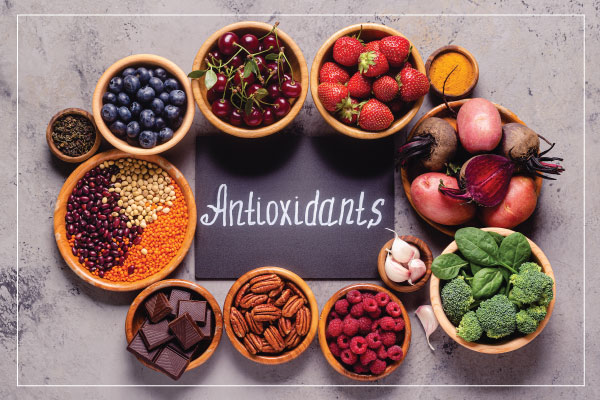
In some cases, such as sulfur-rich foods, it’s not a case of the foods being rich in glutathione, but rather the sulfur compounds helping the body increase glutathione production. Sulfur-rich foods include shallots, onions, and garlic (6).
Other foods that may help increase glutathione production are those rich in sulforaphane. In one study (7), sulforaphane was believed to increase and restore blood and cellular glutathione levels. Sulforaphane is found in cruciferous vegetables, such as cauliflower, cabbage, bok choy, broccoli, kale, and more.
As we previously mentioned, the amino acids that comprise glutathione, are made within the body. But when our bodies become stressed or sick, the body increases its demand for these amino acids to battle the injury or sickness we are facing.
Because of this, we can increase the amounts through eating foods that will give us that extra boost we need. Foods like whole grains are high in all three amino acids. Sunflower seeds or lentils are full of cysteine, and tempeh and tofu can help give us glycine.
Turmeric, a spice rich in curcumin, a powerful antioxidant in its own right, has been studied and has demonstrated the ability to biosynthesize glutathione within our cells (8). Lastly, food such as avocados, spinach, asparagus, and okra naturally contain high levels of glutathione.
While you may love eating these naturally glutathione-rich foods, unfortunately, the compound has trouble being properly absorbed because the digestive enzymes in our gastrointestinal tract break it down. And the more we cook and process the food we eat, the more it deteriorates.
This is where supplements come into play, but first, let’s look at the advantages of increasing our glutathione levels.
The Benefits of Glutathione
Integrative medicine has long recognized the health benefits of glutathione. Peer-reviewed studies showed that boosting glutathione in those who are 35 years and older demonstrated improved skin elasticity and fewer wrinkles (9). In addition, glutathione is also used for skin whitening and overall improvement in skin health. For more information on glutathione and skin our recent article, The Ultimate Guide to the Best Hair, Skin, and Nails Vitamins has more information.
Other research with human studies concluded that glutathione works as an anti-inflammatory and may help reduce stiffness and pain caused by arthritis(10).
Glutathione Supports A Healthy Immune System

As we mentioned above, glutathione is a key element in supporting a healthy immune system. If you have a glutathione deficiency, taking a supplement of glutathione may help to improve your immune system’s ability to battle bacterial and viral infections (11).
When our immune system is working at its best, we also find that our stamina, endurance, and overall energy improves. Because glutathione delivers fuel to our cells, optimal glutathione levels allow them to work at peak efficiency(12). A stronger immune system may also help treat those who suffer from psoriasis.
Psoriasis is an autoimmune skin disorder resulting from excessive levels of systematic inflammation and abnormal immune system response to this inflammation. But if we increase the concentration of glutathione in the bloodstream, we may help lower the severity of inflammation and health problems (13).
Those who have a glutathione deficiency may increase their risk for developing diabetes, Parkinson’s Disease, and even cancer. This is because glutathione works to decrease free radical damage to the cells in our body and may therefore lower our risk for developing these diseases (14).
Lastly, the most vulnerable are our brain and our heart. Glutathione works to protect oxidative stress on the heart and brain tissues that may occur as part of the aging process. This may help to lower our risk for cardiovascular diseases as well as age-related dementias, such as Alzheimer’s disease (15).
As we previously discussed, our body already makes glutathione. The body’s reserves are often depleted due to high levels of mental and physical stress, toxins in the environment, and an overworked immune system. This is why more glutathione may be needed in the form of oral glutathione or a glutathione infusion.
The Best Glutathione Supplements
The best glutathione supplements are ones that are easily absorbed into your body. This leads us back to liposomal glutathione, which has better overall absorption, especially when taken on an empty stomach.
In one study (16), oral glutathione supplementation was shown that through daily consumption, the body was able to increase in absorption of the antioxidant, but also showed an increase in GSH levels. Knowing this, let’s talk about some of the best glutathione supplements you can take. Before we do though please make sure you get professional medical advice from your healthcare practitioner to make sure any new supplement you take is right for you.
1. Pure Encapsulations Liposomal Glutathione
This is one of our favorite glutathione supplements as it provides enhanced absorption by being in a liposomal form. This helps it survive the digestive process and be absorbed by the body effectively. The manufacturer recommends taking one or two soft gel capsules daily, in divided doses with meals. Make sure to refrigerate this formula.
2. Metagenics GlutaClear
We like Metagenics GlutaClear for its easy-to-swallow tablets and because it is GMO-free and made without gluten. It is a great option to give you that healthy boost you want in your glutathione production and works to support your body’s cells and energy production.
3. Pure Encapsulations: Reduced Glutathione
This reduced glutathione supplement promotes itself as an antioxidant for the liver. It works to synthesize and repair DNA, helps with the transportation of amino acids, and helps to detoxify harmful compounds. It may also help to ensure overall healthy cell function and particularly, liver function.
4. Integrative Therapeutics Glutathione Cell Defense
This patented combination supplement includes stabilized reduced glutathione (GSH), anthocyanins (which may aid in the prevention of cancer (17)), and L-cysteine. They work harmoniously together to support healthy cell development and make sure you won’t have a low glutathione level.
5. Montiff Pure Glutathione Powder
This formula, in powder form, may help detoxify your liver, promote the health of your immune system, slow down aging, and protect against low glutathione levels. Ensuring that your liver is functioning properly and is not glutathione-depleted, may help to detoxify harmful chemical compounds within the body.
Glutathione With NAC
As stated above, cysteine is one of the amino acids that make up glutathione. But when taken as a supplement, it is often in the form of N-Acetyl Cysteine (NAC). Our bodies turn this into cysteine and then further into glutathione.
So, what does it mean when we take glutathione with n acetylcysteine? First, n acetylcysteine helps break down mucus in the body aiding in the relief of respiratory conditions. Second, it can help avoid side effects caused by drug reactions and toxic chemicals (18).
If you would like to include n acetylcysteine while taking glutathione, we suggest Pure Encapsulations NAC 600 mg, to help support glutathione production, detoxification, and immune defense. You may also like Pure Encapsulations NAC 900 mg to work on your overall defense system.
Combining NAC with glutathione gives that extra boost you may be looking for to help replenish your glutathione levels. If you want to learn more about NAC, be sure to check out our Definitive Guide to N-Acetyl Cysteine.
The Best Glutathione Supplements With NAC
6. L-Glutathione Plus
This supplement, from Douglas Labs, makes the perfect solution if you don’t eat as many fresh foods as you would like. If you are recovering from an injury or illness, L-Glutathione Plus may help give your immunity a boost and keep you at your best. This particular formula combines L-glutathione with N-Acetyl-Cysteine (NAC) to work with your body and help it to produce glutathione.
7. Liposomal Glutathione
This Douglas Labs supplement is gluten-free and non-GMO and is made to support detoxification of the body, support liver health, and cellular function. If you fear that your levels of glutathione are low, taking this supplement may help to boost your reserves as well as enhance your mental and physical health.
8. Liposomal Glutathione Liquid
Sometimes, we prefer taking supplements in liquid form. So, if you are looking to supplement your glutathione with a spray, this may be the perfect solution for you. It promotes overall cellular health and function, protein synthesis, and overall tissue health.
We also love it because it is non-GMO, gluten-free, and is vegan-friendly. This particular supplement is promoted as a dietary supplement, and may lead you to question why? Does glutathione help you lose weight? Well hang on, this is exactly what we’re about to answer next.
Can You Lose Weight with Glutathione?
Many often ask if glutathione supplements can be used as a dietary aid? Researchers have asked themselves this same question. The answers are promising, and here’s why. Oxidative stress may be connected with weight gain, as seen in one post-kidney transplant study. (19) Many patients gained weight due to the oxidative stress that took place.
Beyond this, some studies demonstrate the correlation between glutathione levels and weight loss through dietary therapy (20). What this strongly suggests is that the GHS levels are an important indicator of how well we respond to dietary intervention. In plain English, the higher our levels of glutathione the better our body functions and works to lose weight.
Bonus Questions About Glutathione

Is Glutathione Safe to Take Every Day?
The main reason to take glutathione is to build up your reserves, even if you have other reasons such as weight loss, are battling psoriasis, or getting over a vicious disease, like cancer. That said, you may choose to take a supplement orally for a couple of months and then talk to your doctor about where you are at (21).
How Do You Know If You Need Glutathione?
There are many reasons why your glutathione levels may be down. Some people suffer from what is known as glutathione synthetase deficiency. It is a metabolic disorder that influences their ability to produce glutathione.
In many cases, people may not realize they have this deficiency if not for the other symptoms they experience. Symptoms such as metabolic acidosis, the build-up of too much acid in the body, anemia, an iron deficiency, suffering from frequent infections, and more (22).
That said, we all experience mental and physical stress daily, live with environmental toxins, don’t always eat clean, or avoid alcohol. Therefore, anyone could benefit from taking a glutathione supplement to ensure that your body is working at optimal health.
How Do You Know If Glutathione Is Working?
This may depend on the reason you are taking glutathione. If your skin is the main purpose, let’s say you experience psoriasis or want to combat aging, if you see an improvement in your skin, then it’s fair to say it is working.
If your purpose in taking glutathione is to lose weight and you are also following a healthy diet and exercise regimen, then weight loss may be a good indicator that it is performing. Or, you might simply feel better overall.
Can I Take Glutathione and Vitamin C At the Same Time?
You can. One study that looked at ascorbic deficiencies concluded that vitamin C can augment lymphocyte glutathione when taken together (23). Regardless of whether you have an ascorbic deficiency, it’s important to cover all your bases.
Taking them together may help ensure that you have a healthy immune system that includes all the vitamins, minerals, and nutrients to keep you at your best. We conclude that glutathione and vitamin C work well together as a team.
Can Glutathione Help with COVID?
There is still a lot we don’t understand about COVID. There are some studies (24) that suggest that increased glutathione in the body through a combination of GlyNAC may be beneficial to COVID-19 patients but more research is needed to draw conclusive results.
While humans do make glutathione, there are many reasons why our reserves can become depleted. Taking action in the form of eating a nutritious diet, one that includes glutathione-rich foods may help. But we all know the struggle of maintaining a healthy lifestyle.
There is strong evidence that low levels of glutathione can affect our health negatively; we develop a higher risk for obesity, our immune system can become compromised, and the list goes on. This is where we believe taking a glutathione supplement may greatly help your overall health.
NOTHING IN THIS WEBSITE IS INTENDED AS OR SHOULD BE CONSTRUED AS MEDICAL ADVICE. ANY HEALTHCARE AND/OR NUTRITIONAL MATERIAL CONTAINED IN THIS WEBSITE IS FOR CONSUMER INFORMATIONAL AND EDUCATIONAL PURPOSES ONLY. SUCH MATERIAL IS NOT INTENDED AS MEDICAL ADVICE FOR CONDITIONS OR TREATMENT, NOR IS IT INTENDED AS A SUBSTITUTE FOR A MEDICAL EXAMINATION BY A HEALTHCARE PROFESSIONAL. CONSUMERS SHOULD CONSULT THEIR OWN HEALTH CARE PROFESSIONALS FOR INDIVIDUAL MEDICAL RECOMMENDATIONS.
The above statements have not been evaluated by the FDA and are not intended to diagnose, treat or cure any disease.
The Best Glutathione Supplements For This Great Antioxidant Sources
- https://www.cancer.gov/publications/dictionaries/cancer-drug/def/glutathione
- https://www.everydayhealth.com/diet-nutrition/diet/glutathione-definition-uses-benefits-more/
- https://www.ncbi.nlm.nih.gov/pmc/articles/PMC3549305/
- https://www.ncbi.nlm.nih.gov/pmc/articles/PMC3549305/
- https://www.differencebetween.com/what-is-the-difference-between-liposomal-glutathione-and-reduced-glutathione/
- https://www.sommerwhitemd.com/eat-these-foods-to-increase-glutathione/
- https://journals.plos.org/plosone/article?id=10.1371/journal.pone.0066407
- https://pubmed.ncbi.nlm.nih.gov/15650394/
- https://www.ncbi.nlm.nih.gov/pmc/articles/PMC5413479/
- https://www.ncbi.nlm.nih.gov/pmc/articles/PMC6661417/
- https://pubmed.ncbi.nlm.nih.gov/11115795/
- https://www.ncbi.nlm.nih.gov/pmc/articles/PMC4328900/
- https://www.ncbi.nlm.nih.gov/pmc/articles/PMC3805302/
- https://www.ncbi.nlm.nih.gov/pmc/articles/PMC2756154/
- Antioxidant research link
- https://pubmed.ncbi.nlm.nih.gov/24791752/
- https://www.mdpi.com/1420-3049/26/13/3807
- https://www.mountsinai.org/health-library/supplement/cysteine
- https://www.ncbi.nlm.nih.gov/pmc/articles/PMC4744494/
- https://www.ncbi.nlm.nih.gov/pmc/articles/PMC6090313/
- https://www.webmd.com/vitamins/ai/ingredientmono-717/glutathione
- https://rarediseases.info.nih.gov/diseases/10047/glutathione-synthetase-deficiency#:~:text=The%20signs%20and%20symptoms%20of,loss%20of%20coordination%20(%20ataxia%20).
- https://academic.oup.com/ajcn/article/77/1/189/4689652?login=false#109582981
- https://www.bcm.edu/news/covid-19-patients-have-increased-oxidative-stress-oxidant-damage-and-glutathione-deficiency#:~:text=The%20results%2C%20published%20in%20the,be%20beneficial%20to%20COVID%2D19
- Magnesium Threonate: An Honest Buying Guide for Health Enthusiasts - March 21, 2024
- Magnesium Citrate Vs Glycinate: 5 Key Differences And Benefits - March 14, 2024
- How to Pick the Best Magnesium Glycinate Supplement for You - March 7, 2024

